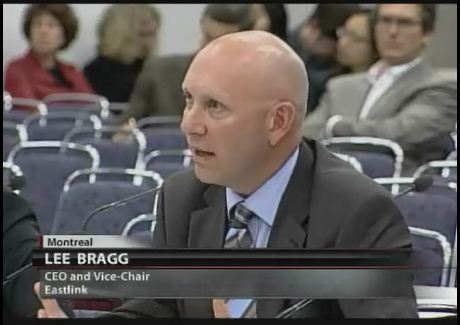
I DON’T RECALL THIS question being clearly asked last week of the company executives who would block Bell Canada’s purchase of Astral Media: Why do you fear Bell would act the way you say it will?
The subject was broached a few times last week during the CRTC hearing and was sort-of asked, just not in as direct a way as we’ve put it above. The answer was given a number of times. Put simply, the executives of Quebecor, Cogeco, Rogers, EastLink and others say Bell is behaving poorly already and they fear an even bigger Bell would act as they themselves would, if given the chance to run the huge group of assets Bell Canada owns and would own, should this purchase be approved by the CRTC and Competition Bureau.
Here’s EastLink CEO Lee Bragg referencing how he believes Bell is already operating: “They are just running the business to the best of their ability and I would likely do the same thing… I am not suggesting that they are evil or doing anything nefarious. They are just trying to run the business to the benefit of their shareholders,” he said.
“It is a challenge, as it is today, because of their dominance, and if we allow it to continue to go further, it becomes even more detrimental… I call it the re-monopolization. If you can control that much of one critical element of the entire system, you can effectively control it all and we just think it is a step too far that we are not really sure how we can compete, to the benefit of our customers, if they just sit there and dictate the terms and conditions that we have to operate at when it doesn't matter to them, because, it is all internal for them,” added Bragg (screen-capped from CPAC.ca during his appearance September 11).

Rogers’ EVP Ken Engelhart had something similar to say when he was asked about Bell just wanting to recoup its content investments and maximize its income – and needing its content to be as widely distributed as possible to make that happen. “I agree with you completely that they have a right to get the money that a media company should be allowed to get, but the problem here is that they're vertically integrated, so suddenly their perfectly rational business incentives are changed,” said Engelhart to vice-chair Tom Pentefountas last Wednesday.
“We're not here saying that Bell are evil or that Bell are cruel, we're saying that Bell are rational business people. The money that they make from their distribution businesses is much more impressive than the money that they make from their media businesses. If they can sacrifice a bit of profit in the media business by not selling to everyone and sell more cable subscriptions and sell more wireless subscriptions and sell more internet subscriptions, they make more money.
“So, you're absolutely right that they are trying not to leave money on the table, but the result is that they're not behaving like a content provider would behave. A content provider like Astral wants to get every last scrap of money out of their content business. A vertically integrated distributor wants to maximize the overall corporate profits which often means enhancing their distribution business and not selling content to their competitors.
“And that's where the conduct becomes anti-competitive and not the kind of profit maximization that's good for the system; it becomes bad for the system and bad for consumers.”
Long story short, these competing executives fear Bell will act the way “rational” businesspeople will act and do what’s best for Bell – the same way Rogers will do what’s best for Rogers and EastLink what’s best for EastLink.
The Commission’s task now is it must decide if Bell doing what’s best for Bell is also good for Canadians.
Final replies by intervenors are due into the CRTC Friday, with the last Bell reply due in a week after that.



